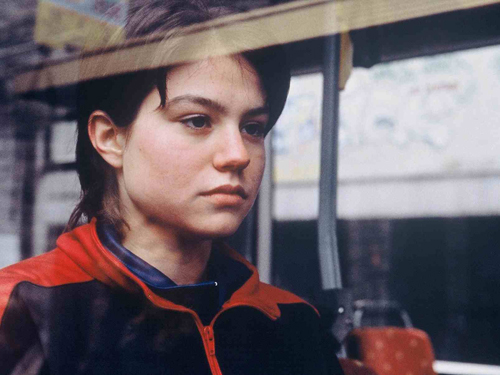
Every day Rosetta leaves for the front – which means she searches for work, for a job that she finds, loses, finds again, is taken from her, that she gets back. She's obsessed by the fear of vanishing, the shame of being a misfit. She wants a normal life just like everybody else, among everybody else.
“The plot comprises little more than this: Rosetta losing a job and searching for another, several times over. The melodrama that one keeps expecting to see − of violence or sexual abuse − never eventuates. Yet few films have the power or sheer monumentality of Rosetta. It makes us feel the killing weight of every object, the difficulty of every gesture, the awkwardness of every interaction.
Rosetta − a sullen, driven, unglamorous, entirely ordinary teenager − undergoes a kind of transfiguration before our eyes. Without once losing her tearing, fraught contact with reality, she becomes for us a veritable Joan of Arc. Her screen presence ignites every kind of passion within us: love, exasperation, compassion, social indignation. Some viewers will inevitably compare her with Björk in Dancer in the Dark (2000). But Rosetta is no idealised projection of a misty fantasy − and the extraordinary performance of Dequenne attains a fusion of craft and pure being that the cinema is rarely privileged to showcase.
How many movies − beyond a few horror-thriller specials − make viewers hyper-conscious of the hero’s breathing? Rosetta is a film completely geared to the physicality of its main character; it is almost as if the movie and her form a single, pulsating entity. We accompany Rosetta every step of her way, plunging down corridors, through heavy traffic, across lawns. Every piece of terrain is a gauntlet. Whenever she ceases moving, the world around her suddenly stops dead − and then the tears, the dread and the disturbed breathing return.”
Adrian Martin1
“More closely than classical neo-realism, the Dardennes’ recent films approach the Bresson of Au hasard Balthasar or Mouchette by distilling their stories into almost mythical, mysterious tales of sacrifice and desire while still fully rendering the vivid details of labor and class.”
Harvard Film Archive2
“I saw Rosetta three weeks ago, and haven’t recovered from it since. ... It moves me to the heart of my heart, this film about the necessity of life, the impossibility of morality, the soil of human experience. [A teaching colleague] told me that he couldn’t watch it because he thought too much about [Robert Bresson’s] Mouchette, but precisely, it’s at last Mouchette today, our Mouchette, the one we deserve, without any heaven and any transcendence. Her scream, ‘Mama! Y’a d’la boue! Y’a d’la boue!’ [‘Mama! It’s full of mud! It’s full of mud!’] haunts me, I can’t forget it, it’s exactly the despair of being in life without any pathos, any margin, just real life in the immediacy of the impulse.”
Nicole Brenez3
“I’ve heard that one critic has attacked Rosetta for not being Brechtian. I’m tempted to counter that the veritable theme song of Brecht’s ‘Threepenny Opera’ − ‘First comes bread, then comes morals’ — could easily serve as one of Rosetta’s rationales for her behavior. But then I recall Hannah Arendt’s gloss on how this line was received in pre-Hitler Germany: It was ‘greeted with frantic applause by exactly everybody, though for different reasons. The mob applauded because it took the statement literally; the bourgeoisie applauded because it had been fooled by its own hypocrisy for so long that it had grown tired of the tension and found deep wisdom in the expression of the banality by which it lived; the elite applauded because the unveiling of hypocrisy was such superior and wonderful fun. The effect of the work was exactly the opposite of what Brecht had sought by it.’
I don’t think it’s possible to misread Rosetta in any of the ways outlined by Arendt, so perhaps I’m misreading the film critic. Clearly Rosetta isn’t esoteric or cerebral or difficult to understand; it isn’t remotely boring or even slightly pretentious. Its only crimes are that it isn’t in English (though it doesn’t have much dialogue anyway), it has something powerful to say about what’s happening right now across the planet, and millions haven’t been spent promoting it.”
Jonathan Rosenbaum4
- 1Adrian Martin, “Rosetta (Luc & Jean-Pierre Dardenne, Belgium, 1999),” February 2001.
- 2Harvard Film Archive, “Realism Reinvented: The Cinema of Jean-Pierre and Luc Dardenne”.
- 3An e-mail by Nicole Brenez in: Jonathan Rosenbaum, Essential Cinema: On the Necessity of Film Canons (Baltimore: JHU Press, 2004), 67.
- 4Jonathan Rosenbaum, “True Grit. Rosetta,” Chicago Reader, 13 January 2000.